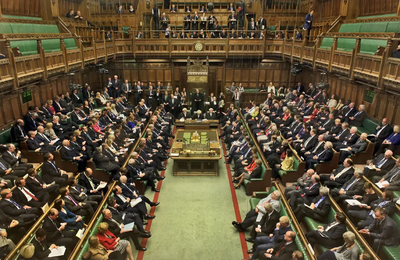Can we calm down the House of Commons?

News that the new SNP contingent at Westminster do not seem able to comprehend the convention that clapping a speaker is simply 'not done' might reflect an intention to make themselves so unpopular with the rest of the country that we would be only too glad to get rid of them, next time they can force a referendum on the topic.
What it does not do, however, is to alter the fact that behaviour in the commons continues to be uproarious and a less than edifying example to the rest of the country, regarding how to behave. No wonder some children seem uncontrollable. We were once offered an end to 'yah-boo' politics; but nothing has changed during the ten years since that aspiration was mentioned in Tony Blair's time and reinforced by David Cameron in 2010 as aspiring to an end to end 'Punch and Judy' politics.
I would suggest that the poor behaviour of our honourable, right honourable and learned representatives is largely due to three factors. First, the arcane rules under which parliament operates seem designed to create complexity of a nature that almost makes the Schleswig-Holstein question appear comprehensible. These really require restructuring. It is not that I see any benefit in encouraging time wasting applause for a good speech (but then is 'Hear, hear' any better?), but that greater simplicity and clarity over who can do what, and when, might calm matters down.
Secondly, perhaps it is the case that we have too many MPs in the first place to make it easy for those with something important to say to have the opportunity to do so - and that this encourages a 'bear-garden' mentality. But that is something that cannot be addressed without major constitutional reform that must include Proportional Representation.
Thirdly, I would suggest that one thing could be done, relatively quickly. We could take advantage of the opportunity presented by the Palace of Westminster being in such a poor state of structural repair, and relocate parliament, while it is being redeveloped, to a new venue that adopts a less confrontational physical layout. It is not so much that a semi-circular chamber is proven to produce less heated emotions that one that has people facing each other at two swords lengths apart; there are examples of heated emotions in legislative assemblies all over the world where fights break out that are far worse than anything we have seen in Westminster. But I am convinced that having fixed seats for each MP, all seated in a semi-circle facing not the Prime Minister, but the Speaker with parties sitting together in an identifiable group, would make matters generally calmer. In addition, adopting electronic voting would quicken counting divisions and make available more time for debates.
Restricting the length of speeches and limiting interruptions, might also actually allow parliament to do its job.
Just a thought...
---
 Stephen Phillips is a member of the Shepway Liberal Democrats, and his views are not necessarily those of the Party. He has been writing professionally for many years on investment and economic related issues, and has focussed recently on creative writing.
Stephen Phillips is a member of the Shepway Liberal Democrats, and his views are not necessarily those of the Party. He has been writing professionally for many years on investment and economic related issues, and has focussed recently on creative writing.
You can find Stephen online at www.phillips-writer.co.uk